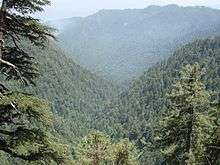Omer Tarin
| Omer Tarin (also Omar Tarin and Omer Tareen) | |
|---|---|
 | |
| Born |
Omer Salim Khan 10 March 1967 Peshawar, Pakistan |
| Citizenship | Pakistani |
| Occupation | Poet, writer, scholar, Chishtiyya-Nizamiyya-Qadiriyya sufi[1] |
Omer Tarin (real name: Omer Salim Khan),[2] DLitt, FRAS, FPAL, etc.; born 10 March 1967, is a Pakistani poet, research scholar, social activist and mystic.[3] In some editions of his works, the name is written as Omar Tarin.
Background
Tarin was born in Peshawar city, in 1967 to the Tarin (or Tareen) family, or clan, of Talokar (village),[4] of the Hazara region of the North-West Frontier (now Khyber Pakhtunkhwa), while his father was posted as a senior civil servant and administrator in Peshawar.[5] From his maternal side, he is related to the Hayat family of Wah, as well as the Hakim Khana family of Lahore, Punjab.[6][7] He was educated at the Burn Hall School (now Army Burn Hall College), Abbottabad and the Aitchison College, Pakistan, prior to graduating from the University of the Punjab, Lahore.[8] He later obtained various higher degrees in English and Post-colonial Studies from Pakistan and the United Kingdom respectively.[9]
Career
After a short time in the civil service of Pakistan, Tarin resigned to become a full-time university lecturer and research scholar and involved himself in literary and academic pursuits.[10] He has published five volumes of poetry in English so far, widely reviewed in Pakistan and abroad, as well as several poems published in anthologies and collections worldwide.[11] His volumes of poetry are : A Sad Piper (1994; 1996 UK),[12]The Anvil of Dreams (1995),[13] Burnt Offerings (1996, 1997) and Riverbeds Flowing[14] and The Harvest of Love Songs (1997, 2000; and UK ed 2003). Since 2005, he has not published any new volumes of poetry although he has been publishing poems independently from time to time.[15][16] In recent years, he has also been involved in various literary and historical projects of an academic nature, chiefly focussing on the colonial history of South Asia,[17][18] in particular North-Western Pakistan. Recent academic publications include works on military history/campaigns on the Frontier and some work on Rudyard Kipling and Kipling's India.[19] A number of these works are available or referenced online, and were published in the Kipling Journal,[20][21] UK and the Journal of the Indian Military Historical Society, also the UK. He has diverse academic and literary interests and is a Fellow of the Royal Asiatic Society, UK, The Tolkien Society (UK), associate of the Kipling Society, and the Indian Military Historical Society (IMHS).[22]
In addition to his literary and academic interests, Omer Tarin has also long been involved in limited social activism, especially in relation to environmental, forests and wildlife conservation, in his native area.[23] He also makes occasional comments on various aspects of global politics and environmental issues in the media, from time to time.[24] He also runs a research and higher education institute in Northern Pakistan.[25][26]

In addition, he has established a private library for research students and scholars in a wing of his home and also donated a sizable collection to the National Archives of Pakistan and the University of Azad Jammu and Kashmir.[27]
Poetry
Omer Tarin's poetry holds a notable place in Pakistani poetry in English.[28] It has a certain erudite grace, a universal, humanitarian quality and passionate involvement that raises it above the general run of much of the work recently published in Pakistan and South Asia, generally.[29][30] It seems to be deeply influenced by the mystic, transcendental tradition of the great Sufi and Bhakti poets of the South Asian subcontinent,[31] such as Hazrat Baba Farid 'Ganj Shakar',[32] Baba Bulleh Shah, Amir Khusrow, Rahman Baba, Kabir Das and even Guru Nanak,[33] in addition to that of the classical Sufi poets and writers of Islam such as Rumi, Hafiz, Saadi and Attar[34]—in terms of its essential lyricism,[35] its engagement with 'human' issues, problems and challenges;[36] as well as in the experimentation with form and content, in ways that have certainly not been attempted by other poets here today.[37] He has also a fascination with Japan and Japanese Culture and esoteric, or meditative practices, which find reflection in his works.[38] In the words of Tariq Rahman, a noted Pakistani scholar and literary critic, "a certain force of vitality" and creative 'intensity' is to be found in Tarin's writings that unveils the depths of the poet's knowledge, wisdom and deep understanding of the cultural heritage of his own society as well as Western and other world literary-symbolic traditions.[39] One of Tarin's early poetic mentors, to whom he owes a great deal and to whom he himself paid tribute, was the late Taufiq Rafat, one of the pioneers of English poetry in Pakistan/South Asia,[40] an important scholar of Punjabi Sufic poetry in his own right.[41] His indelible influence is quite manifest in Tarin's own poetical development.[42]
Tarin's poetry reflects certain basic, recurring qualities such as a broad, universal humanity; a mystical regard for nature, life and the universe;[43] a sense of the frailty of human existence and a continued concern with the central issues of life/death and immortality;[44] which also inform his style, and the system of symbolism and images that consequently arises from this, via which "...new patterns emerge in our perception of the world, of creation, of ourselves and our motivations".[45]
Books
Tarin's major publications include:[46]
- A Sad Piper:Poems ISBN 969-8127-03-8 (1994 first ed)
- The Anvil of Dreams:Poems ISBN 969-8127-04-6 (1995)
- Burnt Offerings, Poems ISBN 969-8127-07-0 (1996)
- The Harvest Season of Love Songs Poems ISBN 969-8127-11-9 (1997)
- Sepoys and Sowars: Historical Essays, Ed ISBN 969-814-01-07 (2000)
- Riverbeds Flowing:Selected Poems (2005)
- Selected Shorter Essays ISBN 978-1-105-15532-1 (2011)
- From Hill and Plain:Selected Short Stories ISBN 978-1-105-18623-3 (2011)
See also
References
- ↑ According to Tarin he also trained with the Mevlevi Sufi Order, the Naqshbandis and also in the Rinzai school of Zen Buddhism during the 1990s. See recent interview by Salma Rafiq, in 'Brilliant Writings' magazine, Lahore, Pakistan, December 2014
- ↑ Apart from his pen-name, he is also known within Sufi contexts as 'Omer Nizami' or 'Omer Chishti-Nizami'
- ↑ Site of the Ishq-Nuri Chishti-Nizami Tariqa of Pakistan, listing its main spiritual lineage Retrieved 28th November 2015
- ↑ Note on Sepoy Sikandar Khan and Tarin family of Talokar, NWFP, Pakistan, including mention of Omer Salim Khan/Omer Tarin Retrieved Woking Borough Council site, UK December 2015
- ↑ Biographical information in the Introduction to "A Sad Piper", Leo Books, Islamabad, 1994 edition ISBN 969-8127-03-8; and 2nd edition London, UK, 1995, p. vi
- ↑ "Omer Tarin " ilyask2". Ilyask2.wordpress.com. 28 November 2011. Retrieved 19 November 2012.
- ↑ Thus, from his paternal side he is a great-grandson of Khan sahib Abdul Majid Khan Tarin, OBE, and from his maternal side a great-grandson of Sir Sikandar Hayat Khan and famed writer Hakim Ahmad Shuja. See Ilyas K, Interview of Nov 2011 above
- ↑ Luminita Karim, article on Omer Tarin in Weekly Poetry Review, in "The Muslim" daily, Islamabad, 28 October 1994, p. 18
- ↑ Introduction, 'A Sad Piper', 1994
- ↑ 'Brilliant writings' magazine interview, December 2014 issue
- ↑ 'Brilliant writings' Dec 2014
- ↑ British Library Catalog entry retrieved April 2016
- ↑ WORLDCAT catalog entry retrieved April 2016
- ↑ Mahmood A. Khwaja (Autumn 1999). "Book Review, "The Poet as Spiritual Being: A Review of Omer Tarin's Burnt Offerings"". Sangat literary journal, Vol. 27, No. 3,. pp. 21–24. Retrieved 19 November 2012.
- ↑ He has, however, recently brought out a small volume of prose writings, "Selected Shorter Essays", 2011. ISBN 978-1-105-15532-1; as well as a collection of short stories, "From Hill and Plain" ISBN 978-1-105-18623-3, as well as some other prose works
- ↑ "Omar Tarin". Open Library. Retrieved 19 November 2012.
- ↑ "News". Jullundurassociation.org. Retrieved 19 November 2012.
- ↑ Notes of Peter Oborne's book 'Wounded Tiger' (2014), referring to Omer Tarin Retrieved December 2015
- ↑ "The Kipling Society". Johnradcliffe.pwp.blueyonder.co.uk. Retrieved 19 November 2012.
- ↑ For example, in Vol 84, No 339, December 2010, pp. 35–52; and Vol 82, No 327, June 2008, pp. 10–22
- ↑ "Name Index". Kipling.org.uk. Retrieved 19 November 2012.
- ↑ "Indian Military Historical Society". Imhs.org.uk. Retrieved 19 November 2012.
- ↑ 'Brilliant writings' Dec 2014
- ↑ "Americas | World reaction to Obama's 100 days". BBC News. 29 April 2009. Retrieved 18 November 2012.
- ↑ "Introductory note to Omer Tarin's poems in Prachya Review, Bangladesh, September 2015".
- ↑ Omer Tarin's comments/Book review The News International, Islamabad, Pakistan ed 27 June 2010 Retrieved December 2015
- ↑ Google Review about the Omer Salim Khan Private Library Pakistan December 2015
- ↑ Pilkington, Introduction to 2nd ed 'A Sad Piper', 1996 ISBN 1-86033-185-8
- ↑ Mazhar ul Salam, Preface to 'Harvest Season', Islamabad, 1997 ISBN 969-8127-11-9
- ↑ "Gina's Interview Series: Famous People From Around the World". Gmcknight.com. Retrieved 19 November 2012.
- ↑ Ayesha Sadozai, Review, Safar-Namah by Omer Tarin: A Critical Note, in Ellipsis literary magazine, Vermont, USA 2013. Retrieved online here, 27 March 2014
- ↑ ul Salam, 1997, aa
- ↑ ul Salam, 1997, aa
- ↑ ul Salam, 1997, aa
- ↑ Česky. "lyricism – Wiktionary". En.wiktionary.org. Retrieved 19 November 2012.
- ↑ Omar Tarin (8 October 2011). "Sophia's review of Burnt Offerings: Poems". Goodreads.com. Retrieved 19 November 2012.
- ↑ Ahmad Zafar (12 May 1995). "Frontier Post". p. 15. Retrieved 19 November 2012.
- ↑ For a detailed report on Haiku and Omer Tarin's work, please see Yasuhiko Shigemoto's interview in The Mainichi shimbun, Japan, issue of 15 August 1998; present Japanese website http://mainichi.jp
- ↑ Tariq Rahman (6 December 1996). "Review of Pakistani English Poetry". The News. Retrieved 19 November 2012.
- ↑ A Review of Pakistani poetry with special reference to Rafat Retrieved 4th December 2015
- ↑ Tarin, "Taufiq Rafat: In Memoriam", obituary in The Pulse weekly, Islamabad, 30 Sept-6 Oct 1998, n.p
- ↑ Rahman, Dec 2006, aa
- ↑ Dr Iftikhar Malik Review
- ↑ E. Cyprian (16 July 1995). "Critical review". "The Nation". Retrieved 19 November 2012.
- ↑ "Customer Reviews: The harvest season of love songs: Poems". Amazon.com. Retrieved 19 November 2012.
- ↑ For further details see The Open Library Catalog for Omer Tarin
Further reading
- A. Rahim, Ed. (1999) "A Select Bibliography of Pakistani Literature in English" ed A Rahim, Islamabad.
- Ian Hamilton, Ed. (1994). Section on Pakistani English poets/writers in "The Oxford Companion to 20th Century Literature".
- "Poetry International" (Asia section), Ed by Edwin Thumboo, Vol 7/8, SDSU Press, CA, USA, 2003.
- Review of Pakistani Literature in English in the "Journal of Commonwealth Literature ", 1997
- Alamgir Hashmi, "Pakistani Literatura in 1993 and 1994" pub in Revista Alicantina de Studios Ingleses, No. 13 (2000)
- Tariq Rahman "Review of Pakistani English Poetry", The News on Friday, The News International, Islamabad ed, 6 December 1996.
- Tariq Rahman "A History of Pakistani Literature in English", Lahore: Vanguard Books, 1991.
- O. Tarin "Taufiq Rafat: In Memoriam", in Pulse Weekly, Islamabad, 30–6 Sep Oct 1998, np.
- Luminita Karim, Weekly Poetry Review, Daily The Muslim, Islamabad, 28 Oct 1994
- B. King ed (1996) "New National and Postcolonial Literatures" Oxford: Clarendon Press.
- Eric Cyprian, "Poems of Considerable Merit"; A Critical Review of Omer Tarin's "The Anvil of Dreams" in daily The Nation, Islamabad, 16 July 1995, np.
- Ayesha K. Sadozai, Vermont, USA, 2013 A Critical Note of the poem 'Safar Namah' by Omer Tarin
